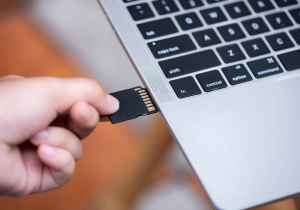- Have any questions?
- 0161 914 5500
- [email protected]

5 Tracking Reports Every Fleet Manager Needs
December 2, 2021
Fuel Prices- What Can I Do?
April 11, 2022 Depending on your individual or business needs, you will be better suited to either a hard disk or SD card storage. To find out what storage would suit you better, we’ve compiled a list of factors for hard disk vs SD card storage to consider before making your purchase.
Depending on your individual or business needs, you will be better suited to either a hard disk or SD card storage. To find out what storage would suit you better, we’ve compiled a list of factors for hard disk vs SD card storage to consider before making your purchase.
How hard disks and SD card storage works with Pay as you Track
Before we delve in, here’s a quick recap of how our SD cards and hard disks work.
- You have installed your Pay as you Track video tracking system (either a dashcam or a multi-camera DVR system).
- With your Pay as you Track device, you will have access to your personal online Pay as you Track portal. This includes live maps, reports, alerts and much more.
- If you have an SD card, and want to retrieve video footage, either remove the SD card and download the footage or go onto your portal and download the footage. It will then be stored on the online portal for future use.
- If you have a hard disk, to retrieve video footage, you can download video footage through Pay as you Track’s online portal for future use.
How far do your vehicles travel away from the depot?
Do your vehicles travel away from the base for days at a time? Perhaps your vehicles travel across Europe? The longer your vehicles are travelling, the more reliable you want your storage system. Hard disks are less susceptible to corruption due to being protected by lockable panels. Reliable data storage keeps your vehicles covered while away from the depot. Therefore, you’re able to stay covered for incidents or liability. An SD card can still be used for vehicles travelling further from the depot with storage on the card being up to a week.
How many cameras are you operating?
If you are operating a one camera dashcam, an SD card with 256GB of storage can record for roughly 184 hours. This is equivalent to one full week’s worth of data before rewriting data. Alternatively, a multi-camera system using a hard disk providing 1TB of storage will store up a month’s worth of footage before overwriting data. This is calculated for a three-camera system. Pay as you Track offers a 2TB hard disk if more space is required. SD cards and hard disks are both compatible with dash-cams and DVR systems. Therefore your choice comes down to how long you want the video data stored on the hardware.
What are you using your vehicle camera for?
SD cards are ideal for those wanting to retrieve footage in the case of an incident. If your vehicle has been in an incident you can set up alerts to your chosen device. If your vehicle gets into an incident you can then download the footage either by removing the SD card from the device or downloading it remotely to our portal. It’s important to download the footage as soon as possible as SD cards hold less storage than hard disks. Once downloaded it can be sent to your insurance supplier. The data will then remain stored on our system.
Hard disks are ideal for those who require data to be held a little longer. For example, if you need to prove that you’ve done a job that a customer is disputing you can download the video footage.
Maintenance Hard disk vs SD Card
SD cards can require more maintenance than hard disks due to being external. In comparison, a hard disk is locked away and therefore is harder to damage. Occasionally there is a situation where drivers will remove the SD cards from the video recorders. Because of this, Pay as you Track has created a tamper alert. This will instantly alert you if the SD card has been removed. Due to a couple of universal factors such as being external, improper ejection and some other reasons you can read about here, it’s recommended that to minimize corruption, you should swap your SD card to a new one annually.
Hard disks benefit from not requiring replacing often and can be run maintenance-free for years. Although hard disks last longer, they do cost more to replace than a single SD card.
